ROI — three little letters that can inspire a combination of rage, panic, and the occasional (okay, weekly) breakdown.
If you’ve tried proving a return on your events, you know it’s about as fun as assembling IKEA furniture without the instructions — and twice as likely to make you cry.
In our latest survey of event organizers, 50% agree: demonstrating ROI is a top stressor. Clearly, you’re not alone.
Here’s the thing, though: proving ROI, or how much money your event generates relative to how much you invested, is a must. It validates the blood, sweat, and tears you poured into an event, and it keeps your budget afloat.
But it is about more than that. We're living in an experience economy, where value isn't just measured in pipeline and revenue. (We know: try telling that to your leadership team.) It's also measured in how your event makes people feel and creating moments they talk about long after the event ends.
Swoogo surveyed 500 event organizers in November 2024 to get to the bottom of what’s keeping you all up at night and how 2025 might bring some relief.
Let’s take a closer look at what we learned.
Events are huge for bringing in the big bucks, and guess what?
Companies are doubling down on them this year, with 41% saying they’re upping their game. (Only 6% say they’ll host fewer events.)
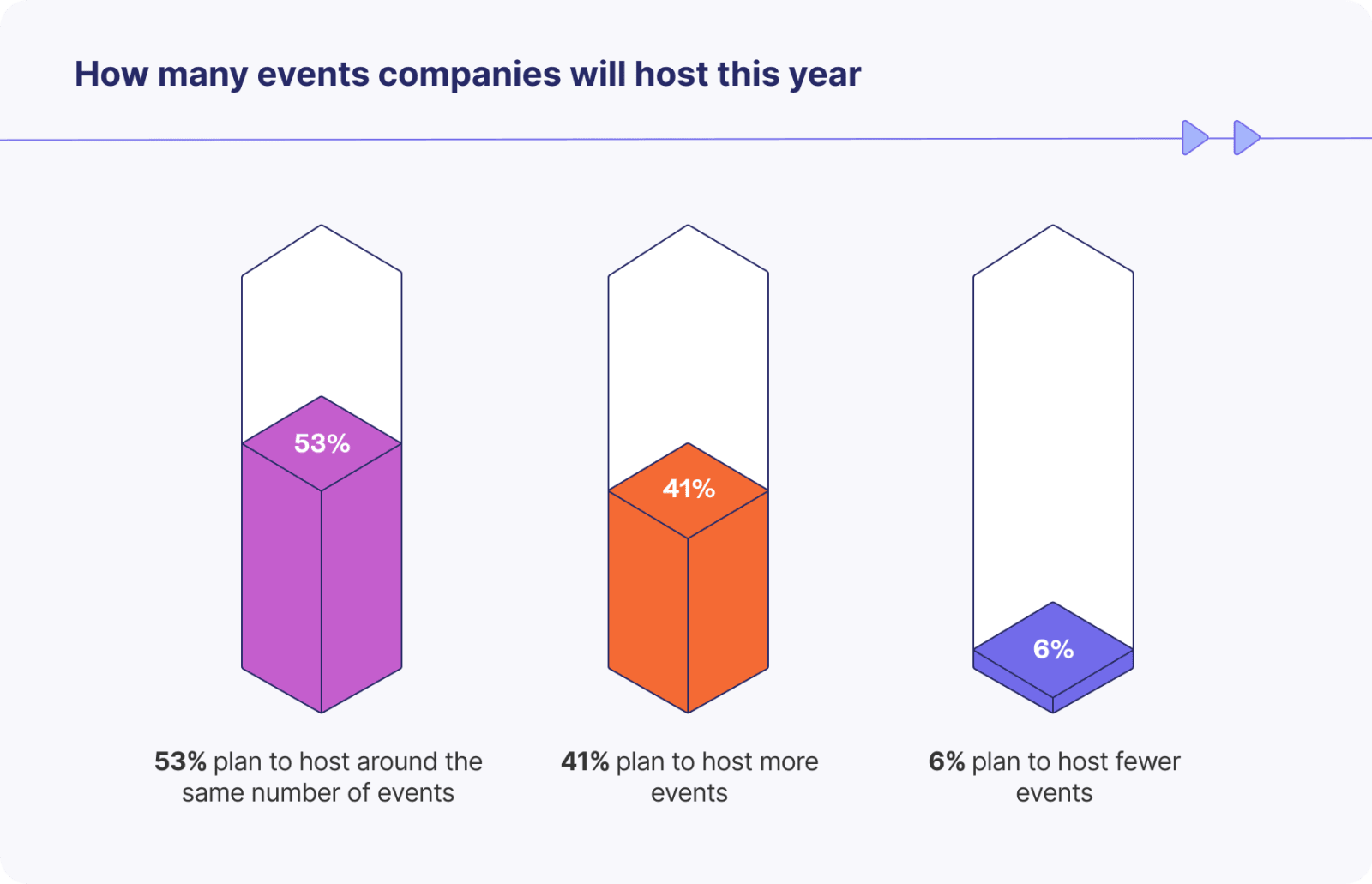
And it turns out that going crazy with the conference lead scanner isn’t necessarily the best way to bring that revenue home.
Micro events (those with fewer than 50 people) are finally getting the attention they deserve.
From 2023 to 2024, in-person micro events hosted on Swoogo jumped 16%, and we can’t argue with this data. Companies can see serious growth with these bite-sized events.
Actually, those investing in micro events are 15% more likely to have an average year-over-year growth rate of 20% or more. Why? Because attendees love that personal touch where they’re treated like people, not name tags. Micro events thrive in the experience economy, where personalization and connection are so important.
But the best part is that micro events are scalable. Event organizers can run more of the right events in less time, with less chaos, and with no (or at least lighter) headaches.
Not convinced? Nearly half (45%) of event pros we surveyed say their companies are getting serious about micro events this year, and almost a quarter (24%) think working on building the right audiences for micro events will be this year’s biggest trend.
💡 Fun FactEnterprise companies were 22% more likely to say they're investing in micro events.
The takeaway: micro events are like espresso shots — small, but full of energy.
If you’re lying awake at night drowning in to-do lists and wondering where your budget went (again), we feel you.
Budget and resources have been the kryptonite of event organizers everywhere for years, and 2025 is no different. It’s the #1 stressor and what’ll likely be the biggest challenge this year.
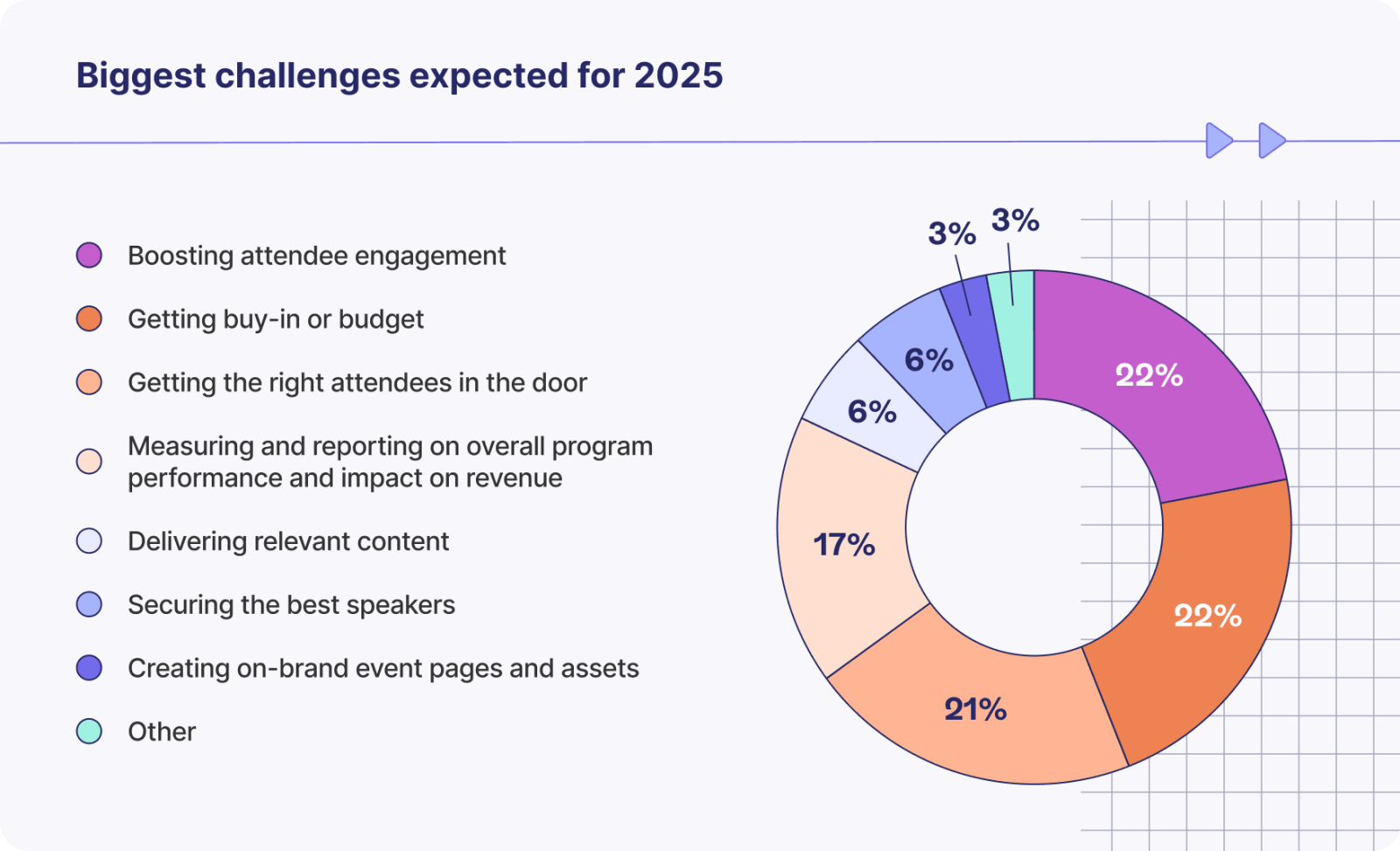
Despite the tight purse strings, 94% of event organizers plan to host the same number of events or more this year. Translation: events are working, but event organizers may be having a hard time showing their value.
We all know what happens at that point: “do more with less” becomes the mantra.
This sounds grim, we know. But fear not — AI is here to save us, or at least lend a helping hand.
44% of event organizers we surveyed think AI will be this year’s biggest trend (36% said generative AI and 8% said predictive AI).
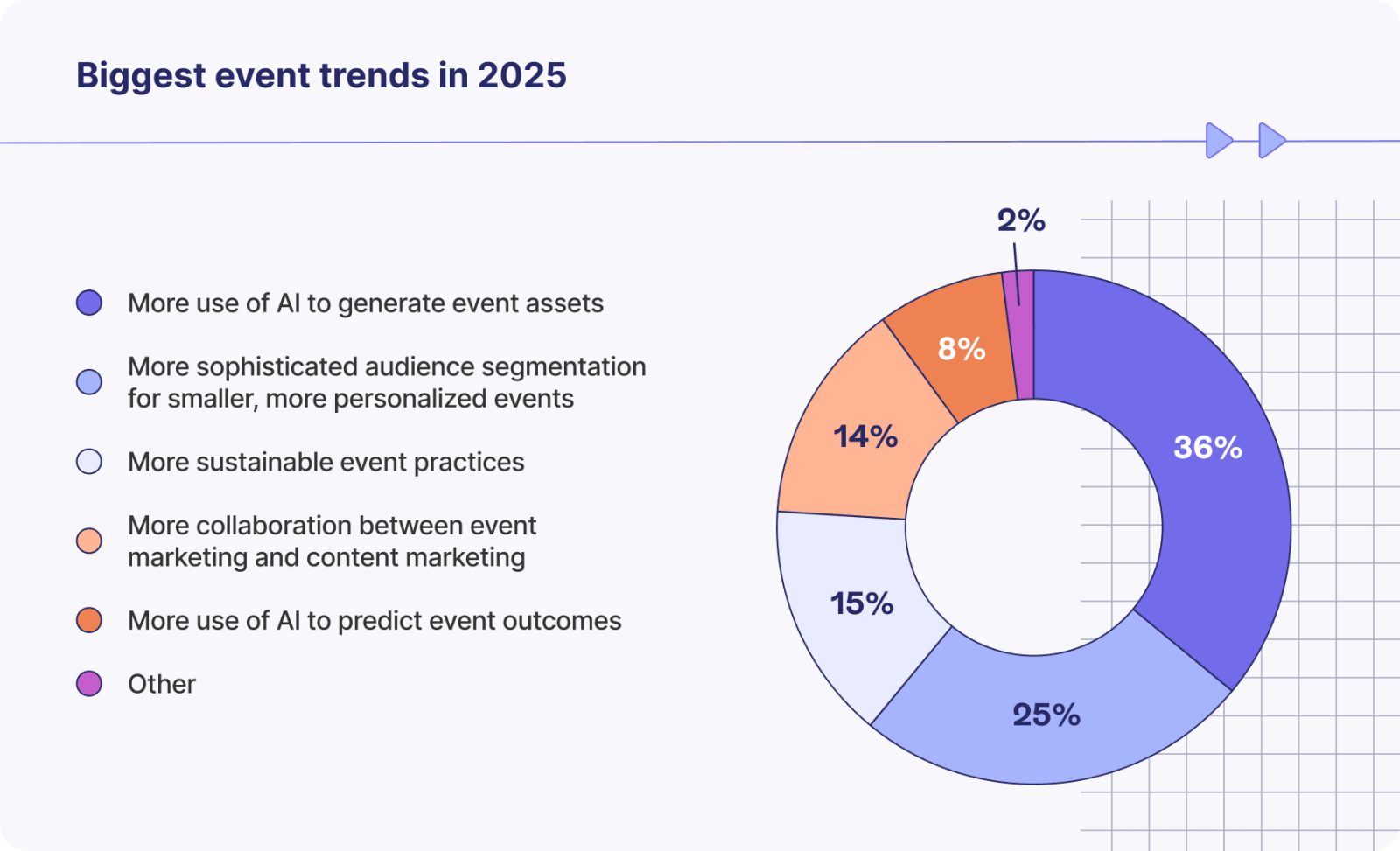
Think: support for brainstorming event content, writing your event promos, and recommending attendee sessions based on their personal preferences. Plus, no more late nights manually pulling registration reports or copying and pasting attendee info.
AI might just be that metaphorical third hand we’ve been requesting for years.
Hybrid events are so 2021.
Remember when hybrid events were hyped as the perfect balance between in-person and virtual events? Turns out, they’re going out of style.
Here’s the tea: companies hosted 25% fewer hybrid events on Swoogo in 2024 than the year before. (In-person events climbed by 12%.) And almost half (47%) have hosted hybrid events in the past, but have no plans to host them in the future.
Why? They’ve decided life’s too short for lukewarm experiences. (And in the experience economy, mediocre doesn't cut it.) Event pros are saying goodbye to the logistical nightmares and awkward attempts to connect in-person and virtual attendees.
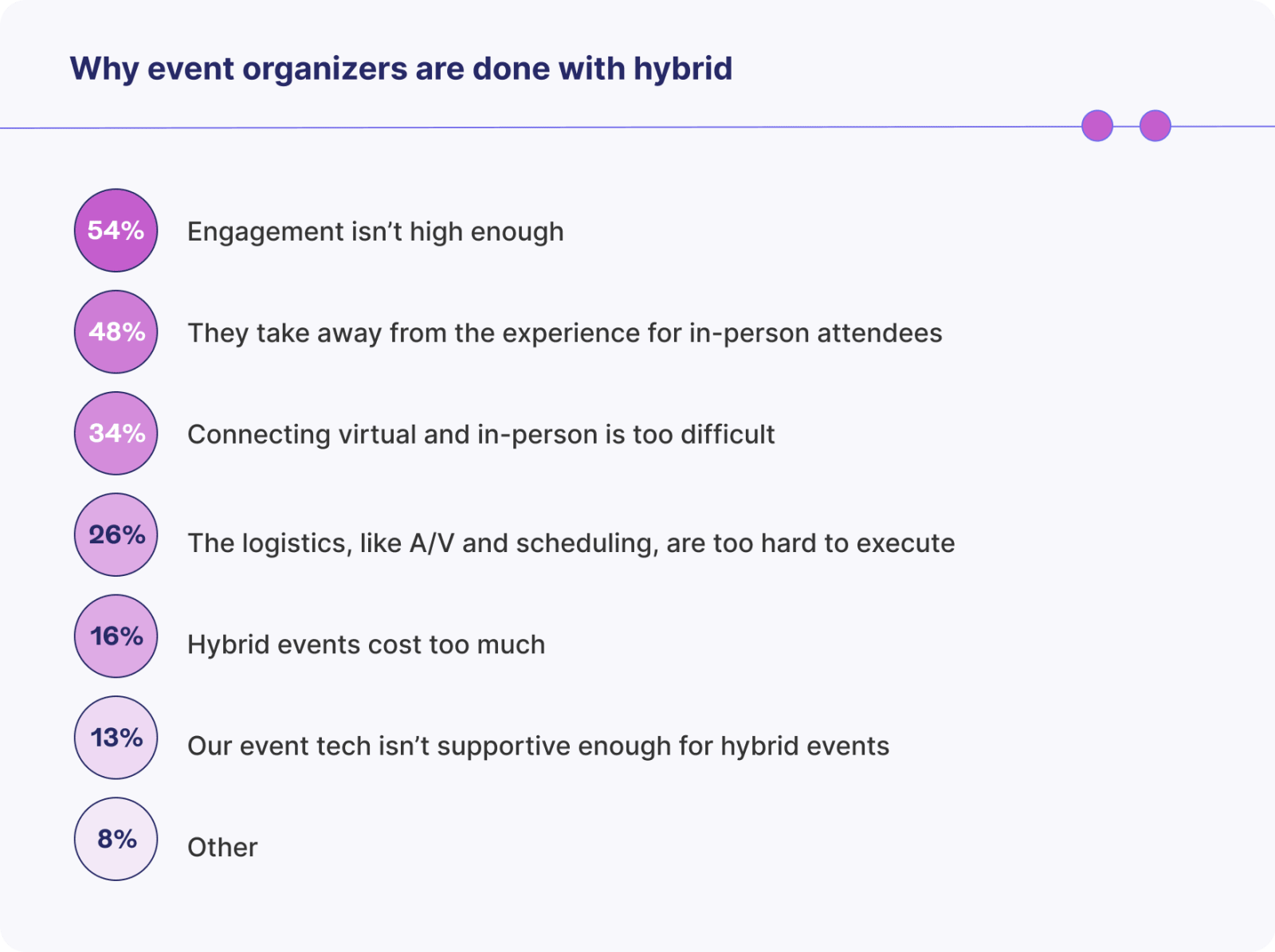
What’s really interesting is that, of the event organizers who have kicked hybrid to the curb, 48% say they did so because hybrid events actually take away from the event experience for in-person attendees.
Hybrid events leave everyone feeling meh, when the goal is for everyone to walk away saying they can’t wait to do that again.
So, bye hybrid events — it’s not us, it’s you.
Let’s play a game of “Would You Rather?”
Would you rather use events more for bringing in new customers or keeping the ones you have?
Can’t choose? Neither can your peers. 71% of event organizers say they use events equally for both.
This is great news. It shows that event teams see the bigger picture. Happy customers are loyal customers — and they tend to buy more, stick around longer, and spread the word.
21% of event pros we surveyed say their events are used mostly for keeping customers. What’s really incredible is these companies are 13% more likely to have an average year-over-year growth rate of more than 10%.
(Fun fact: community and customer events is the #1 event type teams are running, with 59% of event organizers saying it’s on their events calendar.)
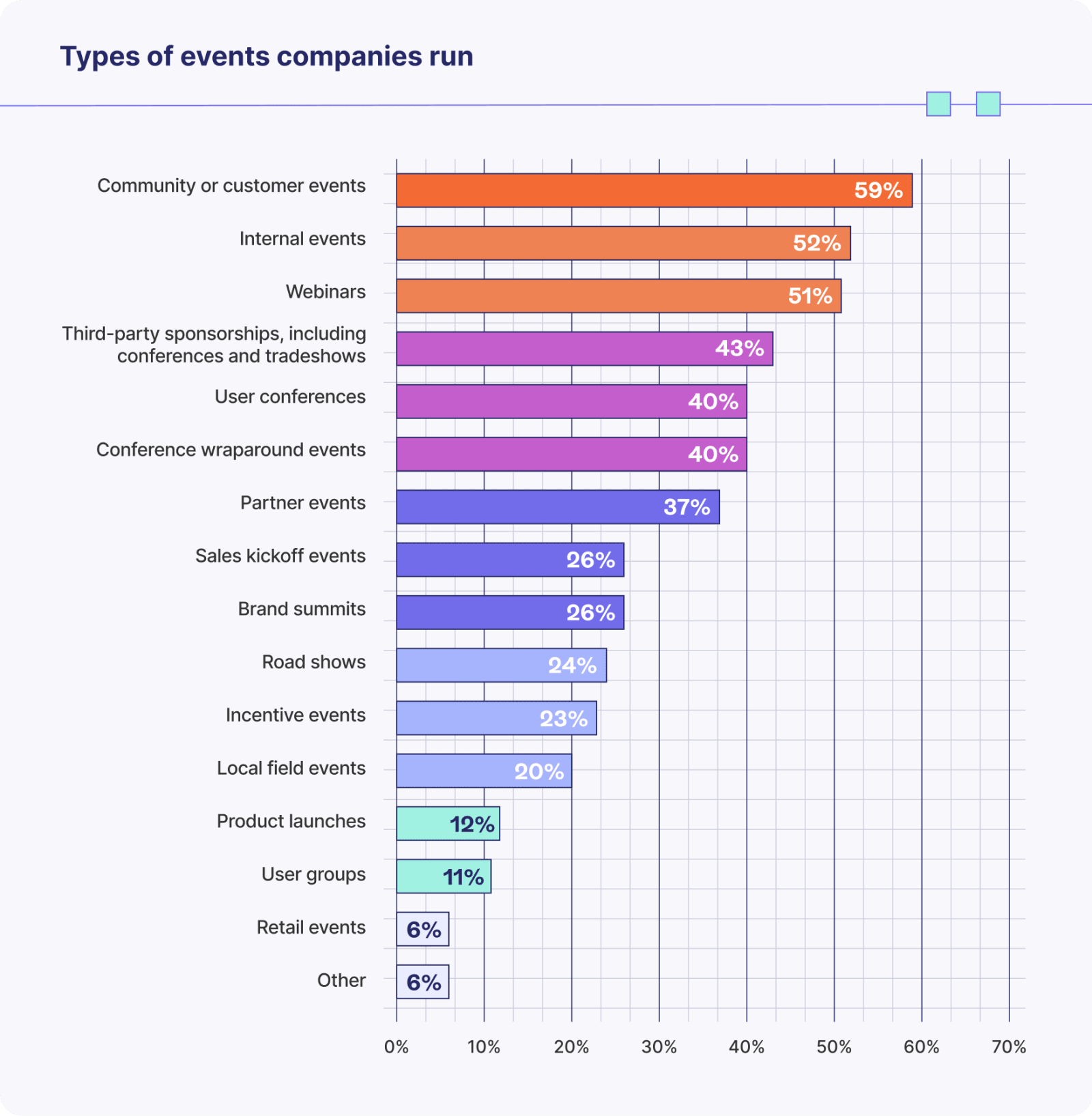
Event pros, we need to have a serious talk.
As much as we'd all love to focus only on the experience, we know that's not reality. And we know you get it: having access to event data and being able to report on it is so important.
But you’ve got limited time and resources, along with a million asks coming from a million stakeholders.
It’s no wonder why getting a handle on event data is always at the bottom of your priority list.
2025 needs to be the year that changes. Let’s look at how we can make that happen.
First, make sure your event management platform is connected to the rest of your tech stack. A significant number of event organizers aren’t doing this, which makes it anywhere from mildly frustrating to nearly impossible to prove if events are working.
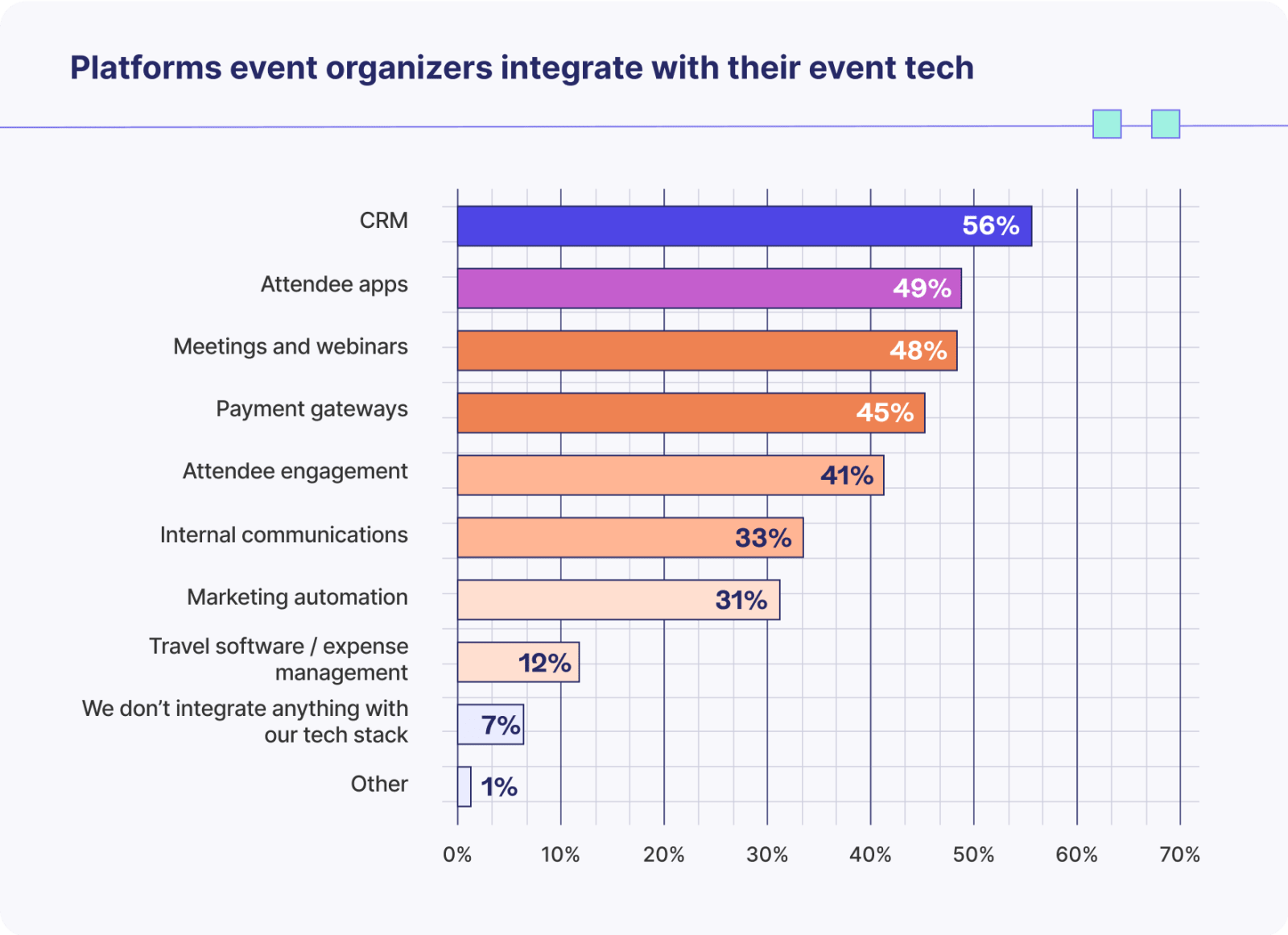
44% of event organizers don’t have their event management platform connected to their CRM, and a shocking 69% don’t have it connected to their marketing automation platform.
💡 Fun FactB2B companies are slightly more likely than B2C companies to integrate their event tech. 39% don't connect to their CRM and 64% don't connect to their marketing automation platform.
You know the benefits of these integrations: automated tasks that no one wants to do, more accurate attendee data, and a view into which events brought home the bacon — and which ones didn’t.
Plus, if you have any interest in scaling your events (who doesn’t?), doing so without these integrations will be painful.
Second, make sure you’re focused on tracking the right numbers. We asked event organizers to rank event KPIs from most important to least important, and their top three were (in order): registrations, attendance rate, and then ROI.
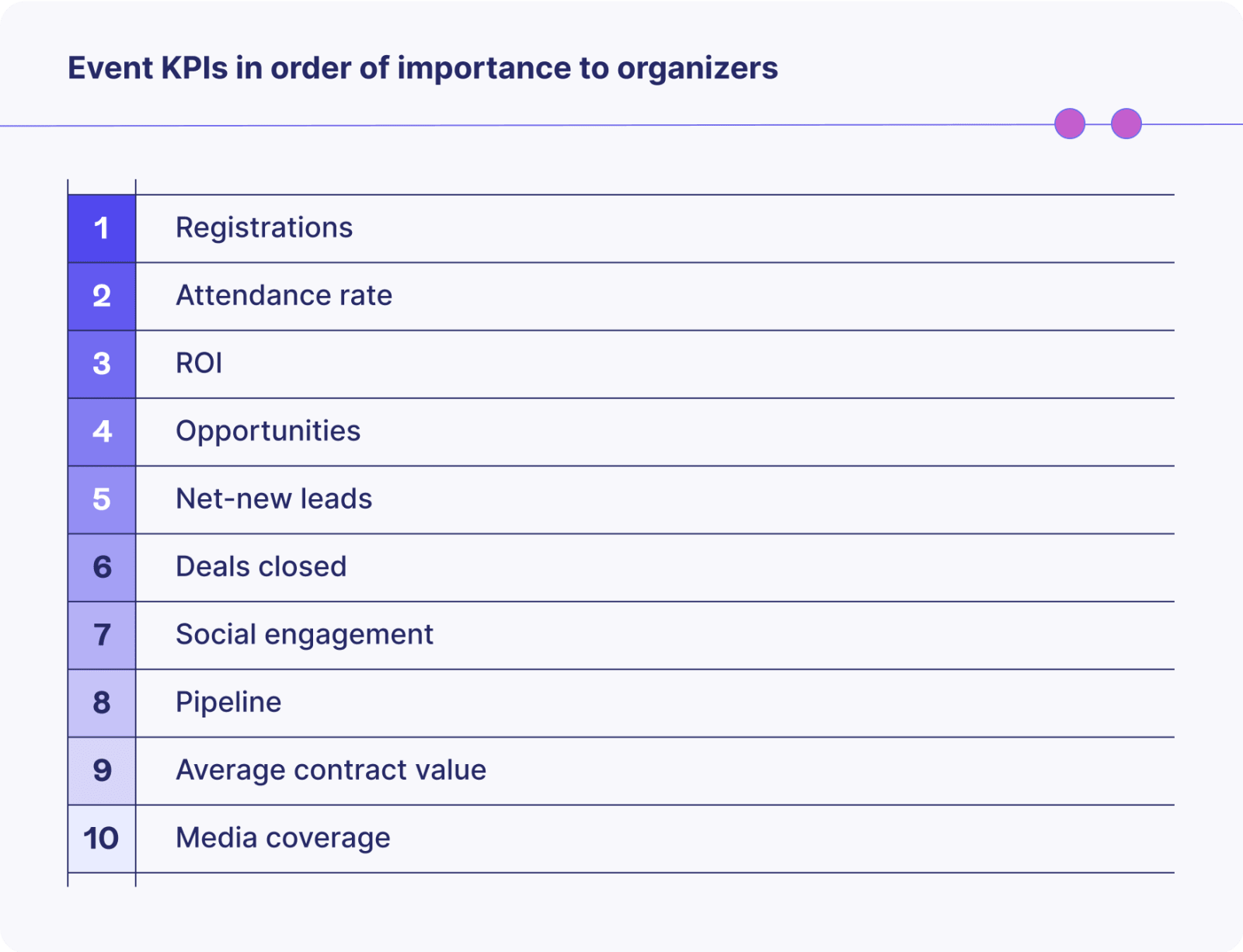
💡 Fun FactWhen compared to non-enterprises, enterprise companies are 57% more likely to say ROI is a priority KPI and 68% more likely to say pipeline is a priority KPI.
Let that sink in. In 2025, most event organizers are still treating registrations as the holy grail of event data. Why?
Again, it’s likely because they lack resources. If companies aren’t enabling event teams to integrate their data, it’s going to be much harder to pull metrics like ROI.
To be clear, there’s nothing wrong with tracking registrations. But to make demonstrating ROI less stressful, companies need to start prioritizing the right event KPIs. As an event organizer, this means you need to make the case for integrations or other resources you need to get this level of visibility into the data.
Events aren’t just alive and well — they’re thriving. Teams are hosting more events, getting more personalized, and focusing on what really drives growth.
Sure, the road ahead has a few bumps (looking at you, budget and data woes).
If you’re one of the many event organizers who think proving ROI is stressful, here’s a hot take: proving ROI is actually the easy part. In the experience economy, the magic happens when you focus on creating great experiences that bring people together. That's the hard part. The results will follow.
Events aren’t just photos of packed rooms and smiling attendees anymore. They’re about reaching new people and building lasting relationships, and we’ve got news for you.
You’re more equipped than ever to crush it. (Just get your ops team on those integrations, now.)
Embrace your informed era. Fill out this form to keep reading.